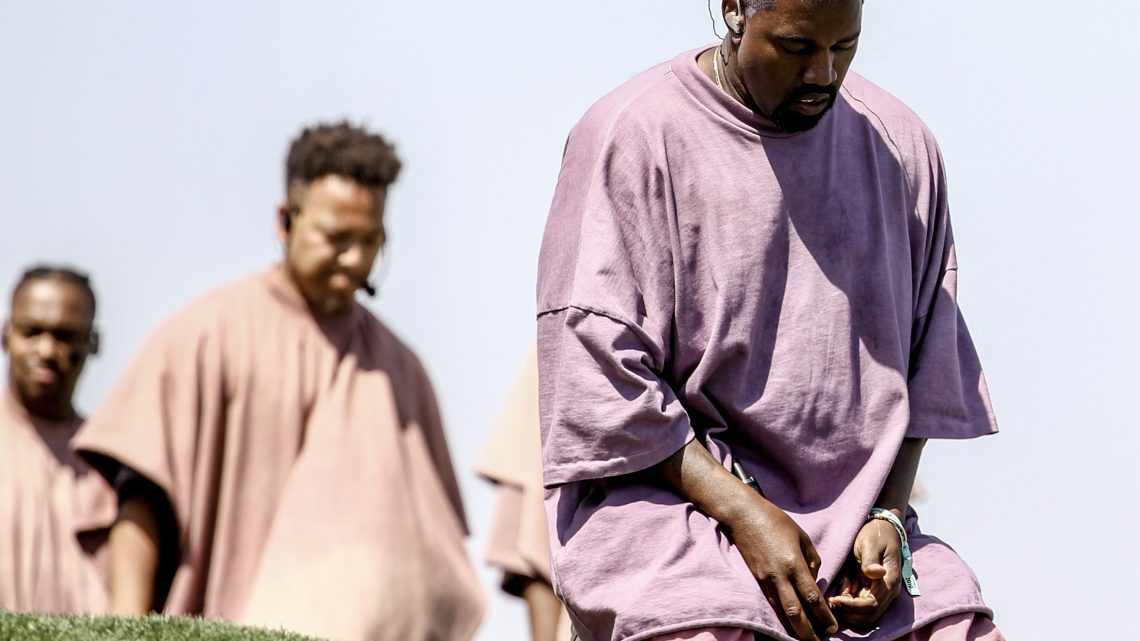
Kanye West’s Quest to Become God
April 30, 2019On the first Sunday of 2019, Kanye West unveiled his latest creative passion: Sunday Service. Every Sunday since January 6, the Kardashian-West family, their friends, and associates have gathered in Calabasas for a transcendent, invite-only jam. There are guest performers and musicians, cameos from young North West, and likely the word “vibes” being thrown around a lot.
For three months we got of glimpses into Kanye’s worship experience through Instagram posts, primarily from First Lady Kim Kardashian West. It all culminated Easter morning with West’s personal Sermon on the Mount, live from Indio, CA, during Coachella’s second weekend, complete with premium-priced merch to mark the occasion.
But what is Sunday Service? Some say Kanye is building a church as a tax shelter, not unlike Kris Jenner’s own former church. Despite the rumors, the family stays on message. “It’s really a healing experience,” Kim Kardashian West told Jimmy Kimmel of the Calabasas services. “There’s no sermon. There’s no word. It’s just music, and it’s just a feeling.” Sister Kourtney clarified, “It is Christian,” and Khloe added that people who feel judged in traditional church settings feel free in the space Kanye has created.
But this healing, freeing experience feels an awful lot like a marketing ploy. Is his latest foray into the marriage of the spiritual and secular truly a ministry to bridge barriers and heal humanity, or is his pulpit just a stage like any other he’d perform on?
Worship is sacred, and in Black culture specifically, worship through music is visceral. The lyrics of the song are important, but the feeling the song invokes is paramount. That’s why church-bred artists like Aretha Franklin and Al Green were able to turn any note into the essence of a rousing spiritual.
West is tapping into music ministry with Sunday Service, flipping his hits into gospel-tinged arrangements using samples from greats like Fred Hammond and the Clark Sisters, and turning classic secular songs with inspirational themes up a notch. It’s not a new concept—Kirk Franklin revolutionized the marriage of hip-hop, R&B, and gospel 20 years ago, and Chance the Rapper brought this back into the mainstream with 2016’s Coloring Book—but it’s a refreshed take, and possibly new to many of Kanye’s disciples.
And it’s a dope idea in theory, and right in Kanye’s wheelhouse. Calling on Jesus as the ultimate guest feature is his thing. As a Black man and artist who has brought God into his work for years, this connection between culture and worship is paramount to not only how Kanye views himself but how he wants to be viewed by the world.
2004’s “Jesus Walks” was praised for its boldness and originality. Chuck D. even compared him to Marvin Gaye. The song earned him legitimate gospel credibility—he was nominated for a 2005 Stellar Award, the highest honor in gospel music besides the Grammy. Kanye’s long-time writing and production partner Rhymefest pondered the track’s impact on the rapper’s career in a 2014 interview with Hip Hop DX: “Looking back on it, we would not view Kanye the same way without [“Jesus Walks”]. [He] would not have as many chances with the public as he has had without that critical piece of the puzzle. It touched people in a place where rap music rarely touches people these days, and that’s the heart.”
The music industry christened the young artist rap’s first real rock star. Nas once said “I think Kanye West saved rap,” later changing that assertion during an interview with Complex, saying Kanye is more “on an artistic mission.” Rolling Stone put him on the cover as Christ in 2006. But West has always been the biggest believer of his own hype. The success of “Jesus Walks” only fueled his narcissism, and the track was his divine VIP laminate: “I made ‘Jesus Walks’ / I’m never going to hell.” His own god complex continued to grow, and he started positioning himself as a deity with titles like Yeezus and “I Am A God.” The titles and nicknames could pass as standard rap braggadocio, but it felt like borderline sacrilege.
Related Post
Kanye’s reach for divinity is part of his public war with himself, a spectacle we’ve been watching play out for over a decade. He’s a modern example of the scripture Mark 8:36, which asks what it profits a man to gain the whole world and lose his soul. Successful producer and artist, heralded as a creative visionary, married to the woman of his dreams, father to a beautiful family, and head of a coveted fashion line. But with every new accomplishment, Kanye seems to have grown more unhappy, more frustrated. He complained more loudly about not being understood, respected, or given due credit.
Kanye took a break from Twitter and the public eye to focus on his health and stability in 2017, only to return in Spring 2018 rocking a MAGA hat and proclaiming that “slavery for 400 years… sounds like a choice.” Kanye seeks praise, but equates attention of any kind with validation, and he was being championed by powerful people, receiving effusive outpourings of support from conservatives, and was in the newscycle. Herein lies the biggest problem with Kanye’s desire for leadership: he doesn’t care where he’s leading, just that people are following.
Released in summer 2018, Ye, West’s eighth consecutive No. 1 Billboard debut, was met with a tepid critical response and saw sales plummet in the second and third weeks, failing to provide him with a musical covering for his behavior. In spite of questionable antics, rants, and breakdowns over the years, he’d always delivered art that kept people invested, engaged and forgiving of his erraticism. Until this.
Within months of Ye’s release, the West crew was in Uganda so Kanye could tap into ancestral energy for his new album, Yahndi. While there,he continued to chide the public. “I'm in Africa recording…The music is the best on the planet. I am the best living recording artist. We, rather, because the spirits flow through me. The spirit of Fela, the spirit of Marley, the spirit of Pac flows through me. We know who the best. We know.”
The comparisons to Fela Kuti and Bob Marley are poignant; both artists led cultural, social, and political movements through their music. These men are legend. Kanye seems to believe he’s destined to lead a movement. He wants to be legend. He just needed to find his own movement.
That’s where Sunday Service comes in.
There’s a long history of Black entertainers in search of redemption and rebranding going through the doors of the church to get there. They profess their sins, admit their failures, and ask for the grace and love of the community—and it often works. At a glance, Sunday Service felt like Kanye’s attempt to come home. When CyHi the Prynce posted a clip of Kanye, a choir, and live percussionists in a clearing getting it in on a Fred Hammond sample in March, those of us who hadn’t been paying attention to Kim Kardashian West’s weekly posts on Instagram finally took notice. Was the mythological “old Kanye” back? Did it matter? And what is this?
The concept is simple enough: Tony Williams, West’s cousin, vocalist, and director of Sunday Service’s rousing choir, The Samples, explained during one of the first weeks that the goal was “to be able to communicate love more effectively.” The sonic references are on point. West is doing what he has always done best: rearranging classic soul songs like the Gap Band’s “Outstanding,” Alicia Meyers’s “I Wanna Thank You,” Anita Baker’s “Angel,” and Soul II Soul’s “Back II Life,” plus deconstructing and rebuilding his own hits to make them bigger and more impactful with the help of the choir and live instrumentation. There are contemporary gospel favorites mixed in with the secular selections, guest appearances from gospel artists, and bona fide praise moments.
Band director Phil Cornish told New York Magazine, “Kanye is ministering musically, [Sunday Service] is intended to really, genuinely offer something that he can stand behind and say this can help people.” Yet it feels more like spectacle than substance. Everyone’s dressed alike, in what appears to be West’s own clothing line, in changing weekly palettes. There’s something ritualistic about the circular grouping in the wooded clearings and fields, and the configuration is odd for a worship experience—it makes attendees spectators, standing outside the center of energy, rather than participants. Add the invite-only celebrity parishioners like Katy Perry and Courtney Love, and it all feels more like a performance-based cult than a church.
Sunday Service isn’t Kanye’s redemptive plea. He’s not making an appeal to his offended fans or the Black community for his 2018 behavior; he isn’t even reaching back to the Black church. It’s a new platform, separate from anything that happened last year, for his own self-indulgence. In the aforementioned Jimmy Kimmel clip, Kimmel asked Kardashian West if people at Sunday Service worshipped Kanye or God. The audience laughed, but the question seemed genuine. It feels like Kanye himself is the center and the object of this worship.
Kanye was supposed to be a Coachella headliner, but plans fell apart when the festival wouldn’t erect a giant dome in monument to the rapper and his church. They’d conceded to building him a hill for an Easter Sunday Service. “He had a date waiting for us,” he told his congregation. We can imagine that “He” does not refer to a Coachella executive.
On Sunday morning, Coachella pilgrims made their way out to the little green mountain outside of the festival campground to partake in Easter Service, Yeezy style, buying $225 sweatshirts reading “Holy Spirit” out of a “Church Clothes” tent along the way. Here again, Kanye was ironically modeling the most damning parts of scripture; a few people referenced Matthew 21:12-13 in response to images of the merch, “Jesus went into the temple and threw out all those buying and selling....He said to them, ‘It is written, my house will be called a house of prayer, but you are making it a den of thieves!’”
Kanye’s Easter Service wasn’t designed as a collective worship experience, it was worship-as-performance, staged for hipsters, influencers and VIPs. TMZ claims50,000 people showed up for the set. That’s half the total attendance for Coachella, and almost half the weekly global attendance for Hillsong services. These parishioners weren’t gathered for a powerful and life-changing morning; they were there as spectators, and this was spectacle, because Kanye can’t help but be Kanye.
From a production standpoint, the performance delivered as a grand-scale payoff of the gatherings that happened over the last several months. Chance the Rapper, Teyana Taylor, and returning ministry guests DMX and Kid Cudi joined as assistant worship leaders. The incredible choir, dancers, and musicians all in shades of mauve created a beautiful moving tableau scattered around the manmade hill. The mount expanded on Sunday Service’s signature circular set-up, with multiple, increasingly smaller levels of elevation. However, it was painfully and obviously metaphoric: the throngs of “common” attendees were at the base of the hill, fenced off from the action. Next were the VIPs, still separate from the service itself, but on the mount. Then came the disciples, the dancers and choir, then the musicians, and then the designated performer at the smallest and highest point of elevation.
Inside the circles were the spirit and power Sunday Service promised, inside the circles were invocation and praise, but the energy wasn’t projected down to the crowd. The design seems like it was more for Kanye’s desired experience—a manufactured reverence, ministering to a huge crowd from the top of a mountain. Kanye has perhaps not realized the difference between doing the work great men are adored for, and simply wanting to be adored as great men are. In the church of Kanye, you’re blessed because you’re watching Kanye be blessed. Your praise is through Kanye’s praise. We’re there to support his connection to God, not seek our own.
Kanye is still arguably a musical genius, but he’s lost the controlled chaos that made him compelling. He’s lost the ability to make us believers. Now, he’s just a dude playing church, and the public is watching for entertainment, not enrichment. Kanye’s ministry is really just about Kanye; Sunday Service is designed for him. He is both the seeker and the redeemer, both the one who needs saving and the one who will save. It’s a church of one, with invitation to watch, but never truly join.
Follow Naima Cochrane on Twitter.
Sign up for our newsletter to get the best of VICE delivered to your inbox daily.


